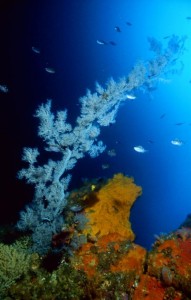 Oceans are becomingly increasingly acidic as rising carbon emission levels see increased amounts of dissolved CO2 entering oceans.
Oceans are becomingly increasingly acidic as rising carbon emission levels see increased amounts of dissolved CO2 entering oceans.
But what’s the long-term impact of this? Someone who knows that better than most is the University of Plymouth’s Dr Jason Hall-Spencer, who in June had a paper published in the journal Nature that examined natural carbon dioxide vents on the sea floor and the fall-off in marine diversity around them.
Dr Hall-Spencer’s research in the Mediterranean Sea was under discussion in a panel session on ocean acidification at the Deep Sea Coral Symposium in Wellington yesterday.
His presentation is available for playback below.
[audio:https://www.sciencemediacentre.co.nz/wp-content/upload/2008/12/coral-symposium.mp3]Dr Hall-Spencer recently told the BBC:
“It’s clear that marine food webs as we know them are going to alter, and biodiversity will decrease. Those impacts are inevitable because acidification is inevitable – we’ve started it, and we can’t stop it.”
According to the BBC: “Globally, the seas now have an average pH of about 8.1 – down about 0.1 since the dawn of the industrial age.
“Around the vents, it fell as low as 7.4 in some places. But even at 7.8 to 7.9, the number of species present was 30% down compared with neighbouring areas.”
Dr Hall-Spencer and Victoria University’s Dr Simon Davy on TV3’s Sunrise programme.